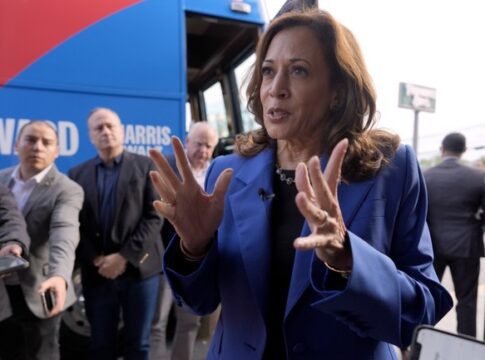President Joe Biden’s address to the United Nations General Assembly on Tuesday morning—his final speech before the body of world leaders, and one of his last public speeches as president anywhere—was also one of the most moving of his 52-year political career, and one of the saddest.
Biden succinctly summarized his broad view of world politics and made it personal, citing his involvement in the ups and downs of war and peace over the past half-century as the basis of his hopes for the future. At the end, he tied his withdrawal from the presidential race to his celebration of democratic principles. “Let us never forget, some things are more important than staying in power,” he said, to wide applause. “We are here to serve the people, not the other way around.”
But the speech was sad because Biden’s heartfelt assurance that leaders can once again pull the world out of its myriad crises is so tragically belied by the anarchic chaos that has engulfed many war-torn regions and makes even the most palliative solutions more difficult. He ended with a line he has recited many times in many contexts: “There’s nothing beyond our capacity if we work together,” so “let’s work together.”
The U.N. Security Council, Biden said at one point, “needs to get back to the business of brokering peace”—a fine sentiment that drew enthusiastic applause, but it’s hard to see how this can happen when the council’s permanent members, including the U.S., Russia, and China, are active rivals in some of the deadliest wars.
Biden’s speech amounted to what might be the last hurrah of the last American president who came of age in the Cold War, when the world’s chasms were clearer and its conflicts more controllable. If Donald Trump reenters the White House, Washington’s commitment to alliances and democratic values will crumble. If Kamala Harris wins, she will likely hew closer to Biden’s views and policies, but may find it no easier than he has to deal with the world’s conflicts and threats.
In his half-hour speech (terse by his normal standards), Biden—weakened but not at all stumbling—took his audience through a pointed recap of his life and times. When he entered the Senate at age 29, in 1972, the world faced “an inflection point, a moment of tension and uncertainty.” The Cold War divided the world, the Middle East was headed toward war, the Vietnam War racked America with anger, and many allies questioned our staying power and our future.
Yet, Biden went on, we all—the U.S. and the world—“got through that moment.” We signed arms control treaties that reduced nuclear arsenals and brought the Cold War to an end; Israel and Egypt forged a historic peace; South Africa’s apartheid regime was ousted; Serbia’s dictator, Slobodan Milošević, was brought to trial for his crimes in central Europe; Osama bin Laden was brought to justice for 9/11; the wars in Iraq and Afghanistan were ended; the U.S. and Vietnam, once at war, elevated their partnership just last year to the highest diplomatic level.
All this, Biden argued, illustrates our “capacity for reconciliation”—and offers “proof that, even from the horrors of war, there’s a way forward. Things can get better.” For that reason, while many people look at today’s problems and “react with despair,” he went on, “I do not. … I know there is a way forward.”
Still, even amid the applause, it is hard to imagine many of the world’s delegates rising from their chairs, determined to meet with their allies and foes at the General Assembly’s many sidebar sessions and, once and for all, settle the differences that have divided them for so long or so intensely.
The world was a very different place in the 1970s, when Biden joined the Senate Foreign Relations Committee and first immersed himself in the high-stakes realm of international politics. Even through the next few decades, just beyond the turn of the 21st century, the East-West rivalry shaped those politics.
At some point between then and now, the shape of those politics changed drastically. The Cold War was a frightful time, but it was also a system of international security; the collapse of the Soviet Union, which brought on the end of the Cold War, also shattered that system. And no new order has risen in its place.
During the Cold War, the U.S. was able to flex its control over other countries because they feared—and sought protection from—the Soviet Union. Now, the U.S. is still, in many ways, the world’s most powerful nation, but it has less leverage over weaker nations because the source of fear—the fulcrum of America’s leverage—has vanished. China may someday rise as a global power, which could foster a new order (perhaps at once more stable and more unstable), but at the moment, its power is still regional.
Midway through his speech, the president quoted his favorite Irish poet, William Butler Yeats: “Things fall apart; the center cannot hold; / Mere anarchy is loosed upon the world.” Biden’s point was that, while many see Yeats’ words, written in 1919, as prescient for 2024, he sees “a critical distinction—in our time, the center has held.”
It is his hope that, with wise leaders, the center will continue to hold. Maybe so. But a more trenchant quote for our times might come from Antonio Gramsci’s Prison Notebooks, written about a decade after Yeats’ poem: “The crisis consists precisely in the fact that the old is dying and the new cannot be born; in this interregnum a great variety of morbid symptoms appear.”




